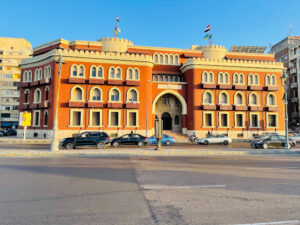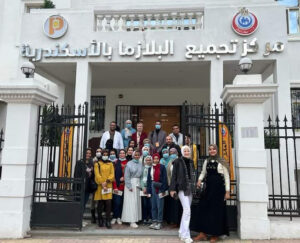- prev
- next
Description
Alexandria University:
Established in 1938 as a satellite institution under Fouad University, subsequently renamed Cairo University, Alexandria University in Egypt achieved autonomy in 1942. Originally christened Farouk University, its nomenclature underwent a transformation to the University of Alexandria post the Egyptian Revolution of 1952. The founding rector, Taha Hussein, played a pivotal role in its early development.

Presently, Alexandria University stands as the second-largest educational institution in Egypt. With 21 faculties and 3 institutes, the university provides comprehensive education across various disciplines, including social sciences, medicine, engineering, mathematics, and other scientific domains. Notably, the university initially had branches in Damanhour and Matrouh, which eventually evolved into independent universities. The International Branch in New Borg El Arab city further extends its global presence.
Beyond the Egyptian borders, Alexandria University has established branches in Juba, South Sudan, and N'Djamena, the capital of Chad. These international affiliations underscore the university's commitment to fostering ongoing research collaborations and contributing to the academic landscape on a global scale.
Affiliation And Recognition Of Alexandria University:
- World health organisation (WHO)
- Medical council of India (MCI)
- Minister of higher education, Egypt.
Faculties Of Alexandria University:
- Faculty of Medicine
- Faculty of Veterinary Medicine
- Faculty of Nursing
- Faculty of Pharmacy
- High Institute of Public Health
- Faculty of Dentistry
- Institute of Medical Research

Quick Highlights About Alexandria University:
| Established Year | 1942 |
| Location | Alexandria, Egypt |
| Type Of University | Public |
| Duration Of MBBS | 5 Years |
| Availability Of Indian Food | Yes |
| Medium Of Learning | English |
| Basic Eligibility | (PCB) is mandatory in 12th class along with English with 75% marks. |
| Required Entrance | NEET with pass score |
| Approximate Fee Structure | 29,00,000 (5 Years) |
Advantages Of MBBS At Alexandria University:
Studying MBBS at Alexandria University in Egypt offers several advantages. The university, being one of the largest in Egypt, provides a comprehensive medical education with a diverse curriculum. Here are some benefits:
1. Historical Legacy: Alexandria University has a rich history, dating back to 1938, and has been a significant player in the Egyptian education landscape. This legacy can contribute to a sense of academic tradition and excellence.
2. Reputation and Accreditation: The university is well-regarded, both nationally and internationally, for its medical programs. Accreditation ensures that the education meets global standards, enhancing the credibility of the degree.
3. Quality Faculty: Alexandria University boasts experienced and knowledgeable faculty members in the field of medicine. This ensures that students receive high-quality instruction and guidance throughout their MBBS journey.
4. Diverse Learning Environment: The university's diverse student body and faculty create a multicultural learning environment. Exposure to different perspectives and cultures can enrich the educational experience, fostering a global outlook.
5. Facilities and Resources: The university is equipped with modern facilities and resources, including well-equipped laboratories and research opportunities. This ensures that students have access to the tools necessary for a comprehensive medical education.
6. Clinical Exposure: Alexandria, being a prominent city, provides ample opportunities for clinical exposure and practical experience. This exposure is crucial for medical students to apply theoretical knowledge in real-world medical scenarios.
7. International Collaborations: The university's affiliations with various international institutions facilitate collaboration and exchange programs, allowing students to engage in a broader network of medical research and education.
8. Affordability: Egypt, in general, is known for its relatively affordable cost of living. Studying MBBS at Alexandria University could be a cost-effective option compared to similar programs in other parts of the world.
9. Global Recognition: The MBBS degree obtained from Alexandria University is recognized globally, enabling graduates to pursue further studies or practice medicine in various countries.
10. Cultural Experience: Studying in Alexandria provides students with a unique cultural experience. Exposure to Egypt's rich history, diverse traditions, and vibrant lifestyle can contribute to personal and academic growth.
It's crucial for prospective students to thoroughly research and consider their individual preferences and career goals when deciding on pursuing MBBS at Alexandria University.
Why Study MBBS at Alexandria University?
Alexandria University is a prestigious institution with a long history and a strong academic reputation. Here are some reasons why you might consider studying there:
- Top-ranked university: Alexandria University is ranked among the top universities in Egypt and the world, making it a great choice for students seeking a high-quality education.
- Excellent faculty: The university has a team of highly qualified and experienced faculty members who are dedicated to teaching and research.
- Wide range of programs: Alexandria University offers a wide range of undergraduate and graduate programs in various fields, including medicine, engineering, arts, and humanities.
- Research opportunities: The university provides students with ample opportunities to participate in research projects, which can help them develop their critical thinking and problem-solving skills.
- International exposure: Alexandria University has partnerships with universities around the world, which allows students to participate in exchange programs and gain international experience.
Eligibility
Eligibility Criteria To Study MBBS At Alexandria University:
The eligibility criteria for Indian students to take admission at Alexandria University are as follows:
Educational Qualification: Completion of 12th standard with Physics, Chemistry, and Biology as subjects, along with English.
Minimum Marks: At least 60% marks in the 12th standard exams.
Entrance Exam: Qualification for the National Eligibility cum Entrance Test (NEET) exam.
Age Limit: Between 17 and 25 years of age.
It's important to note that specific requirements can vary by program, and it's recommended to contact the Education Zone Team for the most accurate and up-to-date information regarding eligibility criteria and admission requirements for Indian students.

Alexandria University Admission Process:
- A student must scan all the essential documents and reserve it within the drive for future need.
- Then visit the college’s official website and search for the entrance form which will be available on the website.
- Fill the application form by providing all the details correctly and click on the apply option in the website.
- After verifying your details an acceptance letter will be prepared by the university and they will send it to your mail address provided during registration.
- Pay the first year fee after the offer letter by online transaction.
- Admission will be confirmed by the authority once the first year fee is paid.
- After the confirmation from the University, apply for a visa and therefore the admission process is completed.
Required Documents:
- Secondary School Leaving Certificate (SSLC) & Higher Secondary Certificate (HSC) attested by the Ministry of External Affairs (MEA), India.
- NEET passing scorecard.
- Birth certificate attested by the MEA, India and the Egyptian Embassy in India.
- Eight passport-sized photographs.
- Original and photocopy of the passport.
- Medical certificate.
- AIDS/HIV test attested by the MEA, India and the Egyptian Embassy in India.
- Acceptance letter from Alexandria University (if applicable).
Fees structure
| Particular | 1st Year | 2nd Year | 3rd Year | 4th Year | 5th Year |
|---|---|---|---|---|---|
| Tuition Fee (USD) Approx | $7,500 | $6,000 | $6,000 | $6,000 | $6,000 |
| Tuition Fee (INR) | ₹5,25,000 | ₹4,20,000 | ₹4,20,000 | ₹4,20,000 | ₹4,20,000 |
| Hostel Fee (USD) | $100 - 200 | $100 - 200 | $100 - 200 | $100 - 200 | $100 - 200 |
| Hostel Fee (INR) | ₹7,000 - ₹14,000 | ₹7,000 - ₹14,000 | ₹7,000 - ₹14,000 | ₹7,000 - ₹14,000 | ₹7,000 - ₹14,000 |
| Total Fee (INR) | ₹5,32,000 - ₹5,39,000 | ₹4,27,000 - ₹4,34,000 | ₹4,27,000 - ₹4,34,000 | ₹4,27,000 - ₹4,34,000 | ₹4,27,000 - ₹4,34,000 |
Hostel
While specific details may change, Alexandria University in Egypt typically provides accommodation options, including hostels, for international students, including Indian applicants. Here are some general points regarding accommodation at Alexandria University:
1. University Housing:
- Alexandria University often offers on-campus housing options, including hostels, to facilitate accommodation for international students.
2. Room Options:
- Hostel facilities may include various room configurations, such as single rooms, shared rooms, or dormitory-style accommodations.
3. Amenities:
- Hostel facilities usually provide basic amenities such as beds, study areas, communal spaces, and sometimes additional features like kitchens and laundry facilities.
4. Security Measures:
- The university typically implements security measures to ensure the safety of students residing in university accommodations.

5. Application Process:
- Indian applicants interested in university accommodation, including hostels, generally need to apply separately. The application process and deadlines are typically provided by the university's housing office.
6. Costs and Fees:
- Accommodation costs vary depending on factors like room type, facilities, and location. Students should inquire about the specific fees associated with hostel accommodation.
7. Off-Campus Options:
- In addition to on-campus options, students may choose to explore off-campus accommodation, such as private apartments or shared housing, based on personal preferences and availability.
8. Residence Permit:
- International students, including Indian students, may need to obtain a residence permit as part of the process for residing in university accommodations.
9. Orientation and Support:
- The university's housing office or relevant department usually provides orientation sessions and assistance to help students familiarize themselves with accommodation procedures and facilities.
10. Early Planning:
- It is advisable for Indian students to plan and apply for accommodation well in advance to secure their preferred choice and avoid last-minute challenges.

For the most accurate and detailed information about hostel facilities and accommodation options at Alexandria University, Indian students should contact the team of Education Zone .



